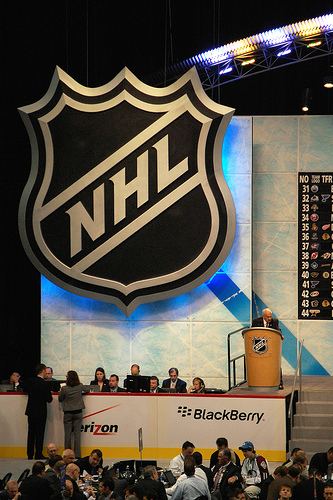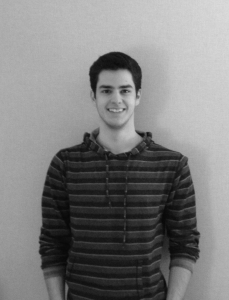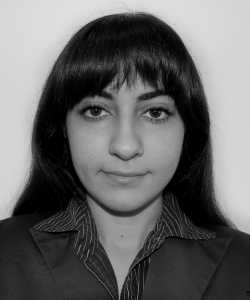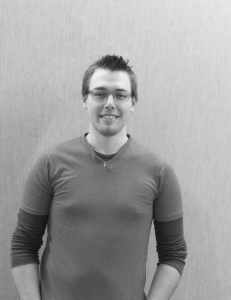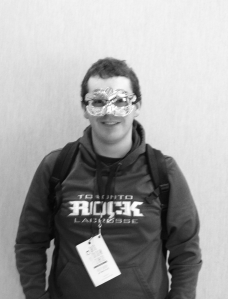By Paul Esau (The Cascade) – Email
Print Edition: January 16, 2013
To celebrate the end of the lockout, The Cascade recently attended a national student journalism conference in Toronto (not exactly true, but forgive us for thinking some celebration was in order). While there, we interviewed several sports editors from other student papers across the country to get their take on the glorious return of Canada’s favourite form of organized violence.
Editor: Brian MacIver
Paper: The Campus
School: Bishop’s University
Location: Lennoxville, Quebec
How have you been covering the lockout?
I’ve been trying not to go every issue, but whenever there’s a big development. When it started I published a big story about it, midway through just to give an update, and now, next issue I’m actually publishing an article about the end of the lockout.
How does your region feel about the lockout?
Bishop’s being a very anglophone school and a lot of people from out of province, people miss the rivalry of the bar, that’s the big thing. The big student bar is The Lion, which is a three-minute walk from campus. Whenever there’s a Leafs and Canadiens game that is the place to be. All the Ontario kids got in their corner, all the Quebec kids got in their’s and they just fight it out in the bar . . . that’s something that was really missed.
And your personal opinion?
A lot of people have been complaining that they’re just fighting over a bunch of money. It’s a lot of money it’s hundreds of millions of dollars. But that’s the thing, it’s hundreds of millions of dollars, and it’s not small issue to divide up billions of dollars . . . I do understand players on this, I’m kind of on the players side, but at the same time the owners, the small market teams are really struggling, and that’s mostly Bettman’s fault because he doesn’t want to move the teams. So there’s a lot of politics behind it, a lot of egos also. Fehr and Bettman are not the most selfless people out there . . . that’s one of the things that will come out of this lockout. It wasn’t necessarily a battle between union and owners. It was a battle between two very stubborn people.
Editor: Kimiya Shokoohi
Paper: The Runner
School: Kwantlen Polytechnic University
Location: Surrey, BC
How did you cover the lockout?
I didn’t. Our Sports section was constantly growing, we didn’t feel that [the lockout] was really of interest to students. It was being covered to death in the daily newspapers . . . hockey is their thing . . . daily it was lockout coverage, [and more] lockout coverage so we were like ‘okay, I think they’ve got it.’
And were you happy with that coverage as a journalist?
Yes and no. I thought the newspapers did an okay job of it, but I thought the broadcasters could have done a better job of it. In sports there’s always a fine line between maintaining that relationship and being a balanced reporter when you’re a broadcaster because you’re a rights holder or you’re trying to maintain a relationship with the gatekeepers so that once hockey is back you can actually go inside and cover it! So I thought they could have done a better job. I was a little disappointed.
How has your community responded to the end of the lockout?
They’re excited, and I knew they would be in Vancouver. We’re not like Toronto where you have lots of choices of what kind of sports fan you want to be. In Vancouver, yes we have the Whitecaps, yes we have the Lions, but hockey rules that town. You know all the sports fans are going to go back to it because what else are you going to do? Follow the Giants? Or the Heat? Which . . . eeugh.
Folks can’t wait to get that Orca back on!
Editor: Adam Williams
Paper: The Omega
School: Thompson River University
Location: Kamloops, BC
How have you been covering the lockout?
We covered it very briefly. We had one set of opinions, two opinion columns that were opposing viewpoints that we ran right at the start. And we ran another set of columns by the same two people this past issue. That was all we did for it . . . We don’t do a ton of NHL stuff or professional sports stuff to begin with unless it is a very large issue that we can tie to campus sports.
How did you feel about the professional coverage of the issue?
I have mixed feelings. My thoughts have kind of changed as the lockout has gone on. It’s obviously frustrating to see millionaires fighting with billionaires about insane amounts of money, but as somebody who looks at sports from a more professional standpoint . . . I do understand that sports is a business. I do find it kind of funny how entitled fans are, and you see it in their reaction to things like the lockout and how outrageously angry some people have been . . . fans do drive the business, they are the customer, but at the same time it is a business and obviously the owners and the players need to each do what is best for themselves and their families.
Do you think one side was at fault more than the other?
I don’t. I think the players knew from day one they were going to lose some stuff in the lockout for the second time around . . . but because there was so much media coverage of it the parties involved were almost made to look even worse than they are. I don’t think anything that happened during the lockout was anything out of the ordinary for a collective bargaining process in labour deals.
How has your community responded to the end of the lockout?
Amongst my close friends and I we are all quite happy that hockey is going to be back . . . I know I do have some friends, like our editor-in-chief, for example, who is one of those people who is just boycotting the NHL now and wants nothing to do with it . . . in my area I’ve seen the whole spectrum.
Editor: Robert Murray
Paper: The Argosy
School: Mount Allison University
Location: Sackville, New Brunswick
How have you been covering the lockout?
In reality I didn’t cover the lockout much. One of the things for me is that I’m really big on fantasy hockey, and of course I couldn’t do fantasy hockey anymore. I had five different leagues when the NHL was playing, so I’m pretty devoted. I did a story on [my ECHL fantasy hockey pool] and put it on the CUP Wire [Canada University Press website] . . . we did a panel on the lockout, on who’s to blame, but in reality I usually just try to cover the local stuff first and there was a lot of local stuff going on.
So what did you think of the professional media coverage of the lockout?
I enjoyed it at first, I thought it was good coverage. But when they started, when the NHL and NHLPA, started doing the media blackout, I sobered up to the fact that the media was sort of facilitating all the mudslinging that was going on, and I think it was best that the NHL and NHLPA kept it under wraps.
Your personal take?
To be honest I was paying attention at first and I kind of zoned out afterwards. People say that hockey was gone, but in reality you could still go to a CHL game, an AHL game, stuff like that. And I enjoyed watching hockey online in different leagues . . . I think the players and the owners have a lot of gaps, and the owners don’t necessarily understand that the players want to play hockey but they deserve to be compensated for what they do. And the players need to understand that the owners are trying to run a business . . . for the owners it is about the bottom line.
How was the end of the lockout seen in your region?
I have a friend from Saint Albert who goes to school with me and he basically didn’t really care. He found other leagues to watch, he found other things to watch. He’s a huge Edmonton Oilers fan, and he kept track of those playing over in Europe and stuff. He found ways to facilitate it. A lot of different people didn’t really care. They asked me a lot what was happening but it was more just feigned interest, conversation starters. Everyone was zoning out.

